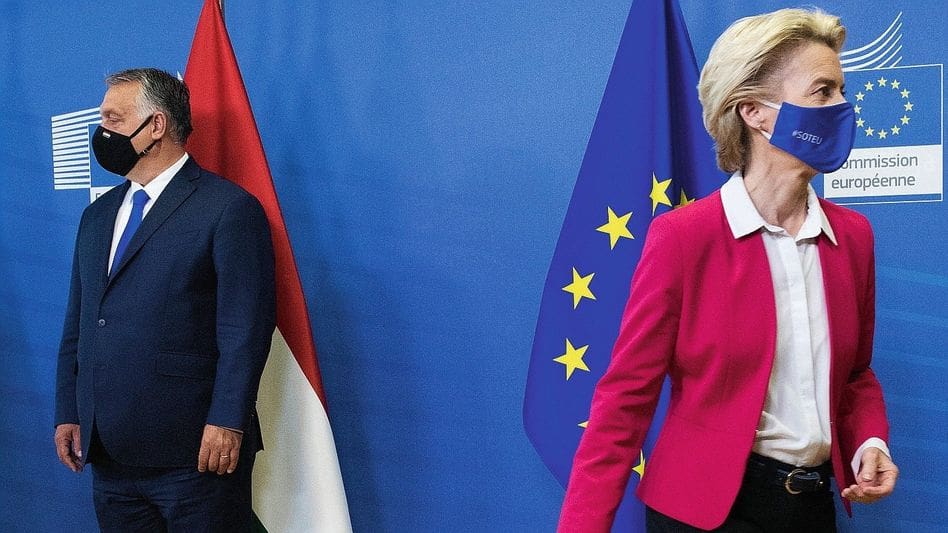The Maastricht Treaty of 1992 was without any doubt the biggest turning point in the history of the European integration project, as it was the document which created today’s European Union in place of the former European Communities. This meant transforming the loose—and mostly economic—cooperation of independent states into a much more centralised confederate structure and giving political power into the hands of the transnational institutions governing it. It was and is clear that giving up certain portions of state sovereignty is not really a loss, as the countries which “pool” their powers together can benefit from the increased influence of the bloc, but there is the never-ending debate whether there is a line which should not be crossed in terms of individual sovereignty – and if we have crossed it already.
The controversies, which arise in regard of this conundrum from time to time, seem to have gradually transformed during the last decades and years. In the initial period, it was more technical issues which made some members question the legitimacy of the Maastricht-system, mainly regarding the EU judiciary, the common defence policy and of course the prospects of the future monetary union. The process of integration was slowed down by these debates, but nonetheless it was able to overcome the obstacles after several nations secured opt-outs following heated protests and series of referenda (such as Britain, Denmark and Ireland). Now, at least for the last couple of years, it seems to me that the debates around sovereignty had left these more-or-less pragmatic grounds and shifted towards a more ideological framework, even if the European Commission wishes to keep it under a veil of objectivity. A thin one, I might add.
What I mean is the fact that the European institutions are attacking certain member states based on political and ideological differences
What I mean is the fact that the European institutions are attacking certain member states based on political and ideological differences—masked by supposed or real rule-of-law violations—is nothing new, but quite worrisome in the same time. In certain ways, the bloc was always split into East and West along the lines of these political divisions, but the cracks have considerably deepened since the outbreak of the European migration crisis in 2015. The question whether it was an unprecedented humanitarian crisis was not debated much, but the means of solving it was, and Brussels’ idea of compulsory redistribution of migrants really touched a nerve regarding the sovereignty of EU member states. And since than many more issues were talked about in a similar manner and, be it about LGBT-rights, family policies, judicial or constitutional matters, Central Europe—Poland and Hungary especially—seems to repeatedly fall into the crosshairs of the European Commission.
Just last week, the Commission had sent out two letters—to Budapest and Warsaw—which on the surface was only about asking questions related to rule-of-law, but in reality it was a clear sign that it was ready to apply its new mechanism which could deprive member states of certain fundings if they fail to meet a number of EU provisions. The letters listed offenses, such as the lack of accountability and impartial judiciary, corruption and problems with public procurement. I am not arguing the Central Europe does not need development in these regards—quite frankly, all countries do—but Poland and Hungary are simply singled out and being targeted via these issues because they dare to oppose some of the mainstream European policy directives and their governments refuse to be peer-pressured into accepting them.
The start of this recent row with Brussels threatening to withhold EU funds by triggering the rule-of-law mechanism suspiciously coincide with certain policies introduced in both countries, which could mean that there is indeed more than just corruption and impartiality. Just the last year Poland introduced the so-called ‘LGBT-free zones’ while the Hungarian government adopted the child-protection law, and both of these were generally regarded in the western states as violations of minority rights. Not long after the Polish decision, the EC ruled that provisions of the European Court of Justice and the EU treaties and amendments can overtake national legislation, even constitutions. Poland’s top court, in response, ruled that no, the Polish constitution always takes precedence over the European courts. And now we are at the brink of another serious political crisis, not because the Polish or Hungarian judiciaries are in fact too corrupt for the EU (if they truly are, it is up to the ongoing investigation to prove it), but because they uphold the legitimacy of policies which do not align with whatever Brussels’ values are.
For Central Europe, these issues are subject to ideological reasoning and political choice
For Central Europe, these issues are subject to ideological reasoning and political choice, which should ultimately belong to the countries themselves to make and not to the unelected bureaucrats of the post-national world. A country is nothing without its sovereignty, because in today’s Europe only sovereign decision-making can protect democratic choice. Any government’s legitimacy comes from its demos, the people who vote for it. These legislations, therefore, represent the democratic will and inherent values of the nations they were introduced in, and if governments were to give in to the blackmailing tactics coming from Brussels, that would simply mean undermining the exact same democracies they say they fight for. Less sovereignty means less democracy, and we are not in a position to give that up so easily. On that note, we should also mention the fact that the EU has already frozen most COVID-19 recovery funds to Poland and Hungary, which is quite ironic considering that they do this for the benefit of the “oppressed” Poles and Hungarians. We are in the midst of a pandemic, for God’s sake, no political agenda should come before helping out our battered economies in such times.
In any case, Poland and Hungary have two months to answer the letters and the Commission will move forward with the procedure after that. It is safe to assume that the issue will not be solved easily, but actually triggering the rule-of-law mechanism, unprecedentedly so far, will not amend things either, but would only cause even graver consequences. I personally hope some kind of compromise will be reached soon because the EU is for all Europeans and we should move forward together, regardless of our political differences.








